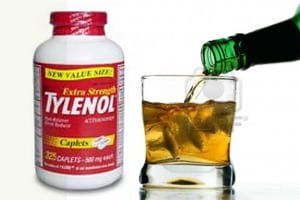
New research has found that mixing Tylenol (acetaminophen) and alcohol can increase risks for kidney disease. Even a very small amount of alcohol consumption when taking Tylenol can lead to serious increased risks. The study revealed that taking the recommended Tylenol dose with even a small amount of alcohol might lead to a more than […]
 New research has found that mixing Tylenol (acetaminophen) and alcohol can increase risks for kidney disease. Even a very small amount of alcohol consumption when taking Tylenol can lead to serious increased risks.
New research has found that mixing Tylenol (acetaminophen) and alcohol can increase risks for kidney disease. Even a very small amount of alcohol consumption when taking Tylenol can lead to serious increased risks.
The study revealed that taking the recommended Tylenol dose with even a small amount of alcohol might lead to a more than two-fold risk of developing kidney disease, say researchers, according to HealthDay News. In fact, the risk is 123 percent according to the new, preliminary research.
“Most people take this medication without any input from pharmacists or physicians, and that’s where the public-health concern is,” said lead researcher Harrison Ndetan, an associate professor for research and biostatistics at Parker University in Dallas, according to HealthDay News. “People buy acetaminophen over the counter, and they also are casual alcohol users, and they don’t know that there is a harmful interaction.”
The study, scheduled for presentation at this week’s American Public Health Association’s annual meeting in Boston, establishes an association between an acetaminophen-and-alcohol combination and increased kidney disease risk, not a direct cause-and-effect relationship; however, the association should not be taken lightly. Dr. Martin Zand, medical director of the kidney and pancreas transplant programs at the University of Rochester Medical Center in New York, pointed out that chronic acetaminophen use and chronic alcohol abuse both have been associated, separately, to both kidney and liver disease, according to HealthDay News.
“What has not been well-studied until now is the link between some regular alcohol use and regular acetaminophen use and increasing your risk of kidney disease above the risk of either of those used separately,” said Zand, who was not involved in the new research, HealthDay News reports.
The researchers analyzed data from more than 10,000 people participating in the 2003-2004 U.S. National Health and Nutrition Examination Survey, which included questions concerning alcohol consumption, acetaminophen use, and health issues. Neither normal use of acetaminophen nor light-to-moderate drinking presented a potential kidney threat; however, a combination led to health problems, according to HealthDay News.
About half of the people who combined alcohol and acetaminophen reported kidney-related problems, according to the researchers. Of the 2.6 percent who took the combination, 1.2 percent reported a kidney dysfunction, writes HealthDay News.
Zand said that, for the most part, people who regularly either drink or take Tylenol should not use the other. “I’m not suggesting people should not use acetaminophen and should not appropriately and modestly consume alcohol,” Zand said. “But it’s not a good idea to take acetaminophen for a number of days in a row and then drink alcohol,” he explained, according to HealthDay News. Ndetan explained that alcohol can interfere with the gene that regulates how acetaminophen is processed in the body and that this might explain the tie between an alcohol-acetaminophen combination and kidney reactions.


